Terri Sewell commemorates the 60th anniversary of the 16th Street Baptist Church bombing

Today is the 60th anniversary of the bombing of the 16th Street Baptist Church in Birmingham that killed four little girls during the height of the Civil Rights Movement. Congresswoman Terri Sewell (D-AL07) spoke on the floor of the U.S. House of Representatives to commemorate this tragic incident of domestic terrorism. “I rise today to commemorate the 60th anniversary of the bombing of the 16th Street Baptist Church in Birmingham, Alabama in 1963, and to honor the lives and legacies of Four Little Girls killed in such a heinous attack,” said Rep. Sewell. “60 years ago, as parishioners of the 16th Street Baptist Church prepared for Sunday service, 19 sticks of dynamite placed by Ku Klux Klan members exploded. As the interior of the walls of the church caved in, over 100 churchgoers rushed for safety. Though most of the congregation escaped, under the debris lay the bodies of Addie Mae Collins, Denise McNair, Carole Robertson, and Cynthia Morris Wesley, as well as Sarah Collins Rudolph, who was injured but ultimately survived. “Tragically, the brutality did not stop after the bombing. When African American communities across the State of Alabama took to the streets to demand justice, they were met with unspeakable violence at the hands of law enforcement,” said Sewell. “Within a few hours, Johnny Robinson and Virgil Ware, ages 16 and 13, were killed in clashes between protesters and the police.” “Despite the horrific nature of this attack, it took over 34 years before the perpetrators faced justice,” Sewell continued. “In 2013, Mr. Speaker, I was honored that my very first bill I passed in this body awarded the Congressional Gold Medal, the highest civilian honor we can give, to the Four Little Girls posthumously to ensure that their lives were never forgotten.” “While we will never recover the lives lost or the injuries suffered, we know that their sacrifice was not in vain,” said Sewell. “Indeed, the loss of the Four Little Girls changed America forever, bringing into clarity our nation’s storied history of racially motivated violence and galvanized the Civil Rights Movement. It was their memory that inspired generations of freedom fighters to build a world where the color of your skin does not determine the value of your life. It was their memory that burned in the minds of the Foot Soldiers as they fought to pass the Civil Rights Act of 1964 and the Voting Rights Act of 1965. And it was their sacrifice that brought our nation closer to realizing its highest ideals of equality and justice for all.” “Without the influence of the Four Little Girls, I not only question where America would be, but where I would be,” Sewell added. “60 years after their passing, I get to walk the halls of Congress as Alabama’s first Black Congresswoman. I do so because of their sacrifice and because they cannot. Their premature and senseless death serves as a constant reminder that every battle, every gain in the fight for civil rights has come at a high cost, paid for by the sacrifice of others.” Dr. Martin Luther King Jr. described the bombing as one of the most vicious, tragic crimes ever perpetrated against humanity, The story of the 4 Little Girls was made into a Spike Lee documentary in 1997 by the same name. Terri Sewell represents Alabama’s Seventh Congressional District. To connect with the author of this story or to comment, email brandonmreporter@gmail.com.
Senate Committee rejects effort to move Robert E. Lee holiday to October
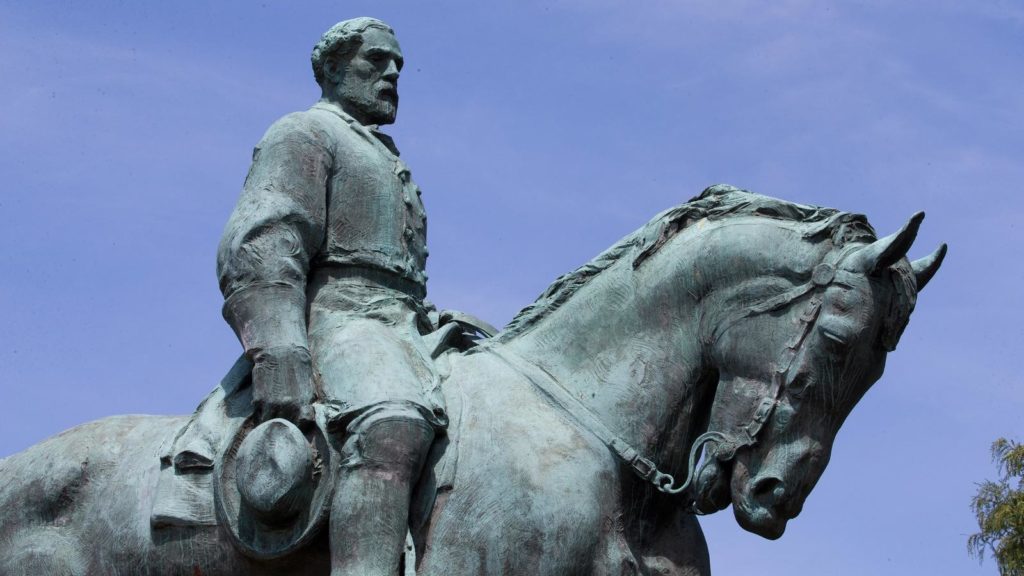
On Wednesday, the Senate Fiscal Responsibility and Economic Development (FRED) Committee rejected a bill that would have moved the celebration of the Robert E. Lee holiday to the second Monday in October. The legislation would have moved the Robert E. Lee state holiday from its current position on the calendar – the same day as the Martin Luther King Jr. birthday holiday in January – to the Columbus Day holiday in October. Senate Bill 130 (SB130) was sponsored by State Senator Vivian Figures. “I brought this bipartisan bill two years ago along with the late Representative Steve McMillan,” Figures said. “We and Mississippi are the only two states that celebrate both of these men on the same day.” “We can’t move the Martin Luther King Holiday because it is a federal holiday,” Figures explained. “October was the time of his (Lee’s) death.” Figures said that Lee was indicted for treason by a grand jury, owned slaves, had slaves whipped, broke up slave families, and led an army that enslaved free Black people and killed African American federal troops who tried to surrender. Figures said that advancing her legislation would benefit the state’s image and boost the economy. A public hearing had been called on SB130, but the people asked to come to the Committee and speak against the bill were not present. The Committee voted not to give a favorable report to SB130 by a voice vote. Following the vote, Figures asked for a roll call vote. Chairman Garlan Gudger told Sen. Figures, “No, you may not.” “I want the record to show that the African-American women voted for the bill, and all of the White Republican men and the White Republican woman voted no,” Figures said. “I am disappointed, but I am not surprised,” Figures told reporters after the vote by the Committee. This is the third year the Legislature has refused to advance this legislation. Figures was not optimistic that the bill would pass next year. “I see the writing on the wall,” Figures said. “Somebody or something is putting pressure on them because even members I thought would support it didn’t.” Alabama Today asked why not move the holiday back a week so that King has a weekend and Lee has his own weekend closer to his actual birthday. “The state doesn’t want that – that costs money,” Figures said. “They don’t want another state employee holiday.” Alabama Today asked why not move it to June and celebrate it on the same days as Jefferson Davis’s birthday. “I wanted a day with a connection to Lee,” Figures said. “He died on October 12.” Figures was asked why not just eliminate the celebration of Robert E. Lee Day. “That definitely won’t pass,” Figures said. Lee, the former Commandant at the U.S. Military Academy at West Point and a veteran of the War with Mexico was a Colonel in the U.S. Army who resigned his commission when his native State of Virginia voted to secede from the Union. Lee then accepted a command as a general in the Confederate States of America in 1861. Lee would become a military history legend in command of the CSA’s Army of Northern Virginia. Following the Civil War, he was President of the College now known as Washington and Lee University. Lee has been admired by Americans, particularly Southerners, for over 150 years. Alabama has celebrated the life of the beloved Confederate General with a state holiday for over a hundred years. Martin Luther King was a Montgomery Pastor who was the acknowledged leader of the Montgomery Bus Boycott and the Civil Rights Movement. He led the voting rights march from Selma to Montgomery after the first march was beaten by State Troopers and the Birmingham civil rights protests while preaching non-violence. King is a winner of the Nobel Peace Prize and is noted for his speeches and writings, including “A Letter from a Birmingham Jail” and his “I Have a Dream Speech.” King was assassinated in Memphis in 1968. President Ronald Reagan signed the bill making King’s birthday a national holiday. When King’s birthday became a holiday, the Alabama Legislature moved the already existing Robert E. Lee holiday to the same day as the King holiday. Wednesday was the 12th legislative day of the 2023 Alabama Regular Legislative Session. To connect with the author of this story or to comment, email brandonmreporter@gmail.com.
Rep. Terri Sewell celebrates Judge U.W. Clemons on his 80th birthday

On Tuesday, Congresswoman Terri Sewell celebrated the birthday of the Honorable Judge U.W. Clemon with a speech on the floor of the U.S. House of Representatives. Clemon was Alabama’s first Black federal judge. He was also a former State Senator. He celebrated his 80th birthday on Sunday, April 9th. “I rise today to honor the extraordinary career of a legal giant and Civil Rights activist, Alabama’s first Black federal judge, the Honorable U.W. Clemon, who celebrated his 80th birthday on April 9th,” Sewell said on the floor of the House. “A native of Alabama, Judge Clemon was born in 1943. Despite much of his childhood in the segregated school system of Jefferson County, Clemon broke down barriers, graduating as a two-time valedictorian, first at Westfield High School in 1961 and then at Miles College in 1965. As a college student, Judge Clemon was a leading voice for civil rights. He marched in countless student demonstrations under the direction of Dr. (Martin Luther) King and played a pivotal role in the Selective Buying Campaign to boycott segregated stores in downtown Birmingham.” “Before graduating from Columbia Law School in 1968, Clemon clerked at the NAACP Legal Defense Fund, forming a life-long association serving as local counsel on numerous civil rights lawsuits throughout Alabama,” said Sewell. “Judge Clemon always understood the importance of the law in the fight for justice and equality. He quickly gained a reputation as an effective and fearless lawyer, taking on Coach “Bear” Bryant to desegregate the all-white University of Alabama football team, and he took on the U.S. Steel Corporation, which led to the desegregation of the American steel industry.” “By 1974, Judge Clemon took his advocacy to the Alabama State Legislature, making history as one of the first two African Americans elected to the Alabama Senate since Reconstruction,” Sewell said. “His tenure as a pioneering lawmaker and skilled attorney caught the attention of President Jimmy Carter, who appointed then-(Alabama State) Senator Clemon to serve as Alabama’s first Black federal judge in 1980. He went on to serve on the federal bench for 30 years until 2009.” “Judge Clemon was a highly respected jurist inside and outside the courtroom,” Sewell continued. “He was known as fair but tough. He demanded that lawyers before him represent their clients competently and effectively. Judge Clemon served as Chief Justice for the United States District Court for the Northern District of Alabama from 1999 to 2006.” “Despite retiring from the bench in 2009, Judge Clemon has remained a vibrant member of the Birmingham legal community where he continues to practice law, serving the underrepresented, vulnerable, and underserved,” said Sewell. “He has received numerous awards, holds three honorary degrees, two street namings, and most recently, an elementary school was named in his honor. On a personal note, Judge Clemon is a trusted advisor, counselor, and a loving father figure to me. My most formative legal experience was serving as a law clerk for Judge Clemon after graduating from law school in 1992.” “I learned so much serving as his law clerk,” said Sewell. “I learned more about the practice of law and saw firsthand what justice looks like by witnessing him in his courtroom. Sitting with him in his chamber was always an educational experience. The Judge tested my knowledge, stretched my legal acumen, challenged my views, and inspired me to be a better lawyer and person. I know that I now serve as Alabama’s first Black Congresswoman because I was blessed by a transformative experience clerking for Alabama’s first Black federal judge. I want to thank his loving family, his wife of 50 years, Ms. Barbra, and his two children, Michelle and Isaac, for sharing him with so many of us.” “I ask my colleagues to join me in celebrating the 80th birthday and the extraordinary career of an exceptional jurist, lawmaker, and public servant, and wonderful counselor, Judge U.W. Clemon, whose life’s work stands as a testament to the power of one person to change the world,” said Sewell. “May the seeds Judge Clemon has sowed continue to bear fruit for generations to come. Happy birthday, Judge.” During U.W. Clemon’s tenure in the Alabama Senate, he chaired the Senate Rules Committee and the Senate Judiciary Committee. Terri Sewell is the first Black Woman to represent Alabama in the U.S. House of Representatives. She is serving in her seventh term representing Alabama’s Seventh Congressional District. To connect with the author of this story or to comment, email brandonmreporter@gmail.com
Steve Flowers: Inauguration day

The Inauguration of our Alabama Constitutional officials was Monday. Our state constitution calls for the Inauguration to be held on the third Monday in January. As you would expect, and as Almanac suggests, it is usually a cold day. Over the years, I have had countless folks harken back to their high school band experiences of marching in the Inaugural Parade, especially ladies who had been majorettes. They had to march and twirl a baton in 20-degree weather with skimpy, legless, bathing suit style attire. It left them with a lasting indelible memory of an Alabama Gubernatorial Inauguration. Mind you, I was not there, but every old-timer who has talked politics with me over the years and who have seen a good many inaugurations, will remark that the January 1963 George Wallace’s initial inauguration as governor was the coldest. There was a lot of frostbite that day. However, the inaugural address from George C. Wallace was hot and heavy. That was the day that Wallace threw down the gauntlet and declared, “Segregation today, segregation tomorrow, and segregation forever.” That was exactly 60 years ago. A lot has changed since that day. It was during the Wallace era that the Civil Rights movement changed the political landscape of the nation and especially in the south. Wallace was an integral part of that historical era. He watched it all unfold from his Goat Hill office overlooking Dexter Avenue, and he was the reason for a lot of the bloodshed. Every time I see an inauguration on the Capitol steps, I reminisce about the history that has been made in that block of Dexter Avenue in Montgomery. The men who wrote Alabama’s overtly racist 1901 Constitution and the crowd that howled in defiance as Wallace made his 1963 declaration would marvel at the change and diversity of today’s Alabama. It is poetic and ironic that this year’s Inauguration Day, January 16, 2023, was on the same day as Martin Luther King Day, a state and national holiday. Kay Ivey grew up in the heart of the Wallace Era in Wilcox County. She cut her political teeth campaigning for the Wallaces. She was especially involved with Lurleen Wallace’s 1966 governor’s race when she was a student at Auburn University. After Auburn, she worked for a while in Banking and teaching in Mobile. She began her Montgomery career as the reading clerk in the Alabama House of Representatives under the tutelage of Speaker Joe McCorquodale. Black Belters, like McCorquodale, controlled the House and the Senate. Kay Ivey’s melodious, pronounced Black Belt accent drew folks’ attention to her reading even the most mundane legalese for hours on end. She later became associated with the Alabama Commission on Higher Education. As their Public Relations and Governmental Affairs Director, she learned the legislative process. She entered the political arena in 2002 when she was elected State Treasurer. She served eight years in that post. She was then elected Lt. Governor in 2010 and reelected in 2014. In the middle of her second term, she became Governor after Dr. Robert Bentley vacated the governor’s office. She served out the last 18 months of his term and was elected in her own right as Governor of Alabama in 2018. She was reelected, overwhelmingly, last year. If Kay Ivey finishes out this four-year term, she will have been Governor of Alabama longer than anyone else besides George C. Wallace. She is the first woman to be elected as a Republican. She is the second female governor, the first being her idol, Lurleen Wallace, 56 years ago. Also inaugurated with Governor Kay Ivey were Lt. Governor Will Ainsworth, Attorney General Steve Marshall, State Treasurer Young Boozer, Agriculture Commissioner Rick Pate, Secretary of State Wes Allen, and State Auditor Andrew Sorrell. Jeremy Oden and Chip Beeker were sworn in for four-year terms on the Public Service Commission. Two Supreme Court Justices, Kelli Wise and Greg Cook, were sworn in for six-year terms in a special investiture last Friday. Justice Kelli Wise was sworn in for her third term. She has served 12 years on the Supreme Court and was on the State Court of Criminal Appeals for a decade prior to being elected to the high court. Justice Greg Cook was sworn in for his initial term on the high tribunal. He is a well-qualified and conservative jurist who will fit in well on the Supreme Court. It was a big day in Alabama politics. See you next week. Steve Flowers is Alabama’s leading political columnist. His weekly column appears in over 60 Alabama newspapers. He served 16 years in the state legislature. Steve may be reached at www.steveflowers.us.
Kay Ivey reflects on past four years
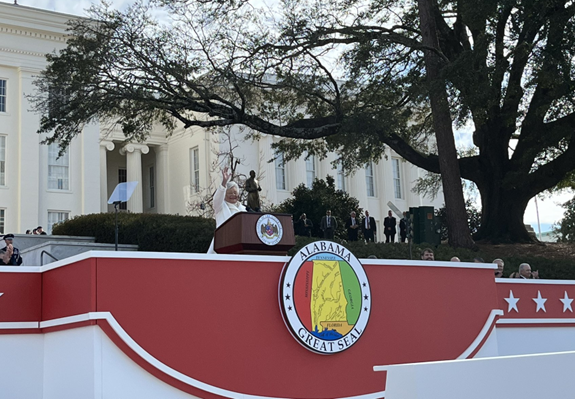
On Monday, Alabama Governor Kay Ivey was sworn in for her second full term as Governor of the State. “Folks, standing here four years ago, I could never have imagined what was to come, but I am certain we came out stronger because of you, the good people of Alabama,” Ivey said. During Ivey’s term as governor, she emphasized road and port improvements, began construction on two new mega prisons, improved mental health services, and rural broadband. “We are making improvements to our roads and bridges in all 67 counties, as well as to the Port of Mobile,” Ivey said. “We are moving forward in constructing of new prisons while also continuing to make productive and reasonable reforms to our criminal justice system. We are making mental health care a priority with the addition of six new crisis centers.” “Speaking of results, over 61,000 more Alabama households and businesses will now have broadband access,” Ivey said. Ivey referenced the trend for biological males transitioning to being females and competing in women’s sports – a phenomenon Ivey has consistently opposed. “Never would I have thought that the day we elect a female governor and a female United States senator, we would also have to fight for our girls to have a fair chance when they compete in sports,” Ivey said. This was the fourth inauguration in a row where Republicans won every constitutional office, but Ivey asked for bipartisan cooperation. “I believe we have more in common than that which divides us,” Ivey said. “We all want Alabama to be the best place to live, we want our people working, and we want our children to receive a high-quality education. To put it simply, we all want to continue seeing more of our Alabama common sense. No doubt, much of our current success is a direct result of reaching across the aisle and working together for the betterment of our state.” Ivey highlighted the economic progress the state has achieved during her term as governor. “We have reached the lowest unemployment rate in our state’s history, multiple times over,” Ivey said. “We have more good paying jobs available today than at any other point before. I am proud to report today that since I have been governor, we have seen business investments in our state totaling $40 billion, which has created 73,000 new jobs. And I assure you, we are not done yet.” Public education has been abysmal in Alabama for years, but Ivey promised progress during her second term. “Alabama will rank in the top 30 states in reading and math for the first time in our history,” Ivey promised. “As your governor, I also support a parent being able to decide what is best for their own child’s education. We need to have meaningful discussions about school choice in Alabama, and I believe that begins with making needed reforms to our charter school option.” Ivey promised to send books to children through the age of five. “We will partner with Dolly Parton’s Imagination Library to ensure every Alabamian can receive books directly to their homes each month after they are born until five years of age,” Ivey said. Ivey promised to reduce regulations on business. “We will reduce burdens holding back our businesses and will cut regulations by 25 percent over the next two years,” Ivey said. Ivey vowed to get tough on crime. “We will back the blue, and that also means we will continue standing behind the men and women who serve our state as corrections officers,” Ivey stated. “Just last week, I signed an executive order to ensure violent criminals remain off the streets. We must do everything we can to ensure we will never again lose Alabamians like Bibb County Deputy Brad Johnson to a man who should never have been out of prison in the first place.” Inauguration day was also Martin Luther King Day. Ivey acknowledged King’s historical impact. “It was in this very place, in the heart of downtown of Montgomery, where Dr. Martin Luther King, Jr. called for equality for all,” Ivey said. “It is my hope we can embrace our history and be able to fully explain to every child how exceptional our country is today.” Dallas and Autauga Counties were hit by tornados on Thursday. Ivey spent recent days surveying the damage and working with local and federal officials to rebuild. “Just a few days ago, tornadoes ravaged parts of our state, stealing the lives of seven of our fellow Alabamians,” Ivey said. “The one light in all of this darkness was our people. Folks all over our state are flocking to the aid of their neighbors hardest hit. Alabamians’ love for each other prevails all, and I am confident we will come back stronger.” “I’m proud to be the second female governor of Alabama, having personally helped Governor Lurleen Wallace get elected in 1967,” Ivey said. “I commit to you today I will work hard over the next four years to build on our roots, so we can address our longstanding challenges, further our progress, and prepare for the future.” To connect with the author of this story, or to comment, email brandonmreporter@gmail.com.
Alabama Gov. Kay Ivey’s inauguration speech
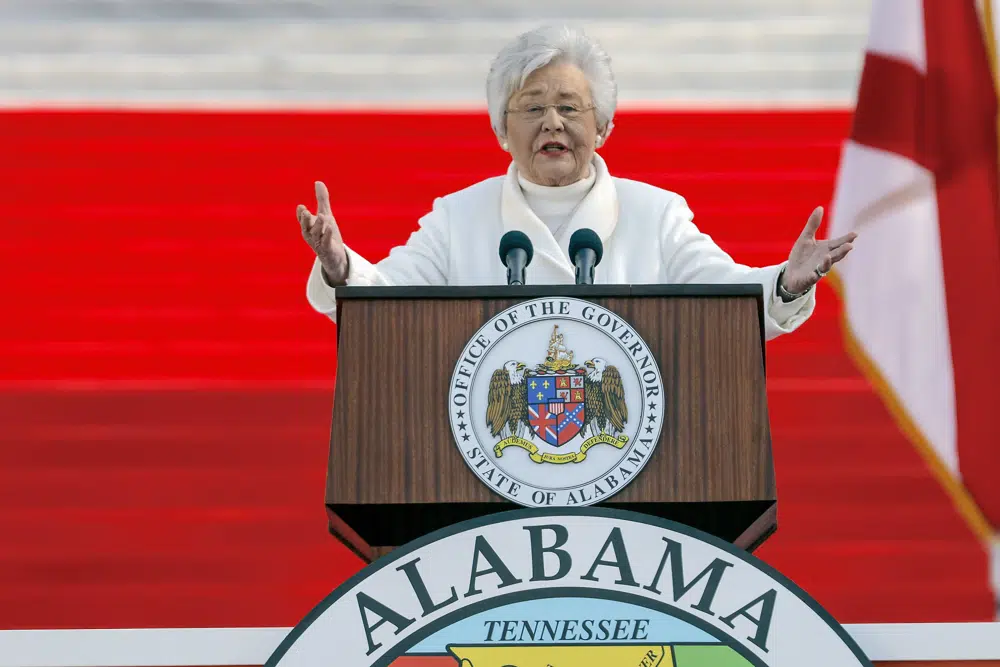
Text of Alabama Gov. Kay Ivey’s inauguration speech given on Jan. 16, 2023. Remarks as prepared: My fellow Alabamians: Today, as we mark the start of a new chapter in our state government, we are reminded of how fortunate we are to call Alabama and the United States of America our home. Four years ago, in this very spot, I said our people are our greatest resource and the fabric that holds our state together during both our best days and the more difficult ones. Folks, standing here four years ago, I could never have imagined what was to come, but I am certain we came out stronger because of you, the good people of Alabama. Just a few days ago, tornadoes ravaged parts of our state, stealing the lives of seven of our fellow Alabamians. The one light in all of this darkness was our people. Folks all over our state are flocking to the aid of their neighbors hardest hit. Alabamians’ love for each other prevails all, and I am confident we will come back stronger. I am truly honored by your overwhelming support. You elected me to serve as your governor for four more years, and that is a responsibility I do not take lightly. To my fellow constitutional officers, legislators, and other public servants, hear me loud and clear. We have a busy, productive, and full four years in front of us. Let us work together, and let’s not waste a single moment. We will keep Alabama working, and, as a team, we will ensure our best days are yet to come. Today is a time for us to celebrate all Alabama is, for us to reflect on what we have accomplished, and, most importantly, to plan for the future we are working towards. I am truly grateful to this year’s inaugural chairs for making today’s historic event possible, as well as the many volunteers, law enforcement officials, and others who lent a helping hand. We don’t need to sugarcoat it: Right now, with the state of our nation, times are tough. An unprecedented pandemic has led to the federal government spending way above our means. This has resulted in record-high inflation, which means higher costs everywhere you turn. Alabamians in every corner of our state stepped up in a real way when the pandemic halted how we live here in our country. And now, as your governor, I am doing everything in my power to step up for you and your families to provide meaningful and responsible assistance. Folks, we are living in what – at moments – feels like an unreal time. When I was a young girl growing up in Camden, I could never have imagined the world we live in today. Never would I have thought that the day we elect a female governor and a female United States senator, we would also have to fight for our girls to have a fair chance when they compete in sports. Over my lifetime, and especially during my years of public service, I have come to know the people of Alabama will never compromise our values. I believe our Alabama values make us who we are. And as your governor, I am proud of who we are, and I will always protect what we believe in, never forgetting our roots. And as we look ahead to a future filled with opportunity and great possibility, I pledge that we will build on our roots by focusing on getting the hard work done today while never forgetting that our work now matters most to our future generations. I believe we have more in common than that which divides us. We all want Alabama to be the best place to live; we want our people working; and we want our children to receive a high-quality education. To put it simply, we all want to continue seeing more of our Alabama common sense. No doubt, much of our current success is a direct result of reaching across the aisle and working together for the betterment of our state. We are making improvements to our roads and bridges in all 67 counties, as well as to the Port of Mobile. We are moving forward in constructing of new prisons. while also continuing to make productive and reasonable reforms to our criminal justice system. We are making mental health care a priority with the addition of six new crisis centers. We have put a renewed focus on the fundamentals of education and are beginning to see tangible results. Speaking of results, over 61,000 more Alabama households and businesses will now have broadband access. Since I have been governor, thanks to the work of the Alabama Legislature, we have cut well over half a billion dollars in taxes. That relief helped everyone from our middle class to our farmers to our small businesses to our first-time home buyers and even to those looking to adopt. We have reached the lowest unemployment rate in our state’s history multiple times over. We have more good-paying jobs available today than at any other point before. I am proud to report today that since I have been governor, we have seen business investments in our state totaling $40 billion dollars, which has created 73,000 new jobs. And I assure you, we are not done yet. The core issues, the everyday issues, are what will continue to be at the top of my agenda for the next four years. Ensuring every Alabama student receives a high-quality education will be my number one focus. We will build upon the foundation we have laid so that by the end of my term, Alabama will rank in the top 30 states in reading and math for the first time in our history but, in order to be first, we have to continue moving up. Here in Alabama, we support – in fact, we encourage – our parents to be involved in their children’s educational journeys, from birth and
Alabama leaders celebrate Martin Luther King Day
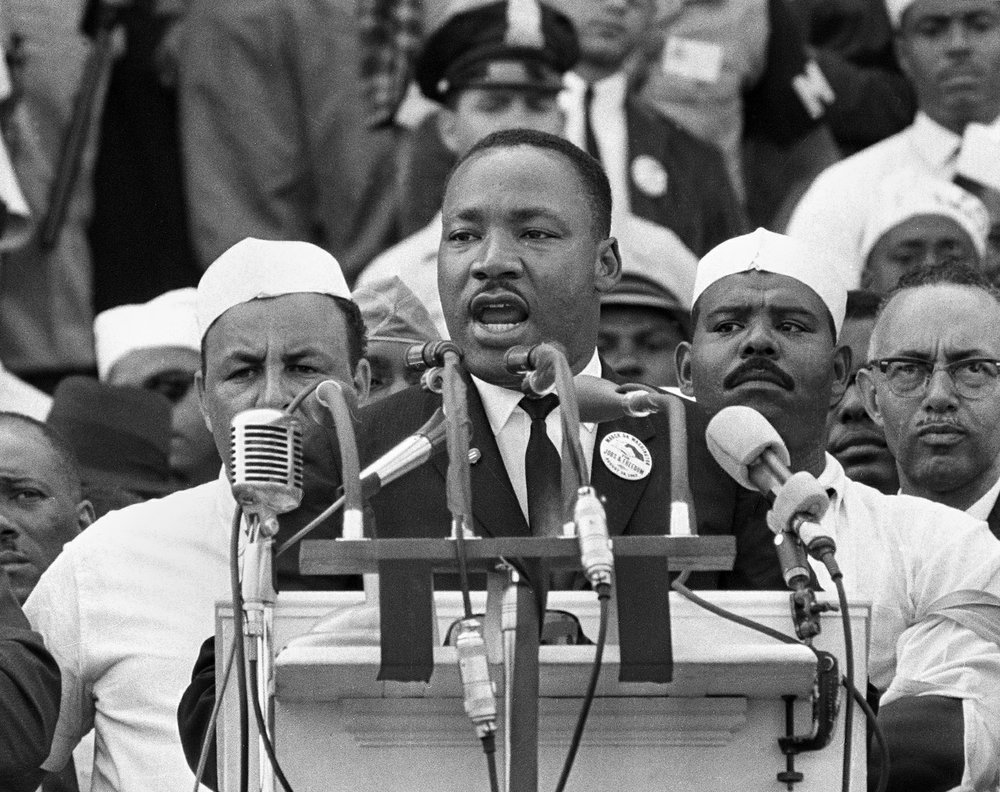
Today is a national and state holiday honoring the Civil Rights Movement icon, the Rev. Martin Luther King Jr. Banks, government offices, post offices, most schools, and many businesses will be closed today in observance of the holiday. King was born in Atlanta on October 15, 1929. In 1955 he was the new pastor of the Dexter Avenue Baptist Church just a block from Alabama Capitol Building in Montgomery. King ignited the Civil Rights Movement when Rosa Parks was arrested for failing to surrender her seat to a White man on a Montgomery bus – then the law in Montgomery and many southern cities. King responded to Parks’ arrest by launching the Montgomery Bus Boycott. Black people, at the urging of King and the NAACP, refused to ride the buses, bringing the bus system to its knees. Eventually, the U.S. Supreme Court ruled that government buses could not discriminate on the basis of race. The Montgomery Bus Boycott made King a national celebrity. He and like-minded Black ministers formed the Southern Christian Leadership Conference (SCLC) to urge non-violent protest to fight discrimination and for social justice. King was the SCLC’s first president. When Alabama State Troopers attacked voting rights marchers in Selma, King went to Selma and led a new march that went all the way to Montgomery, protesting for voting rights. He was beaten, jailed, and his life threatened repeatedly for his bold activism. The Civil Rights Act of 1964 outlawed discrimination in the United States and the Jim Crow laws that had been on the books for generations in southern states. King won the Nobel Peace Prize in 1965 for his work. He was assassinated in Memphis in 1968. He was only 39. King’s “I have a Dream” speech that he made at the Civil Rights March in Washington D.C., was highly influential at the time and is quoted frequently today. King Jr. is easily the most well-known and celebrated civil rights leader in American history, though many people were involved in the movement. President Ronald Reagan signed legislation making Martin Luther King Jr. Day a national holiday. On Monday, at 1:00 p.m. CST, Congresswoman Terri Sewell will host a “TerriTalks” virtual discussion entitled “Carrying the Torch Forward: The Life and Legacy of Dr. Martin Luther King Jr.” Sewell will be joined by King’s son, global human rights activist Martin Luther King III. The conversation will focus on the legacy of Dr. King and the struggle for racial equality and voting rights that continues to this day. It will be streamed live on Sewell’s official Facebook, Twitter, and YouTube pages. Sewell is the first Black woman to represent Alabama in the United States Congress. There are a number of prayers, breakfasts, and other events today across the state honoring Dr. King and his legacy. The Birmingham Civil Rights Institute is hosting a whole day of activities beginning at 10:00 am CST. Visit their website for more information or to buy tickets. Alabama celebrates Martin Luther King Jr. Day and Robert E. Lee Day on the same day. Lee, a noted Confederate general, was born on January 19. This angers some in the civil rights movement. To connect with the author of this story, or to comment, email brandonmreporter@gmail.com.
Today is Robert E. Lee Day

Confederate General Robert E. Lee’s birthday is on January 19, but it is celebrated by the State of Alabama today. Robert E. Lee Day has been an official state holiday in Alabama since sometime in the late 1800s. Lee was the most renowned general of the Confederacy in the Civil War. Today is an official state holiday. State offices and most schools will be closed in observance of the holiday. Federal offices, post offices, and many businesses will also be closed, but that is because today is also Martin Luther King Jr. Day. Alabama and Mississippi merged its Lee celebration with MLK Day after President Ronald Reagan signed legislation, making it a national holiday. Some state legislators have advocated for dropping Robert E. Lee Day from the list of official holidays and making the holiday observance for Dr. King alone. That legislation has not advanced in past legislative sessions. Robert Edward Lee was the son of Revolutionary War hero General Henry “Light-Horse Harry” Lee. Lee was born in Stratford Hall, Virginia, in 1807. His father was a hero, a governor of Virginia, and the dignitary was chosen to write the eulogy for President George Washington. By young Robert’s birth, the Lee’s fortunes had turned sour, and Light Horse Harry served time in debtor’s prison. The older Lee’s health declined, and he passed away in the West Indies without ever getting to know his young son. Robert received an appointment to the United States Military Academy at West Point, where he graduated second in the class of 1829. Lee married Mary Anna Randolph Custis. Lee spent most of his early military career as an engineer, where he supervised and inspected the construction of the nation’s coastal defenses. During the Mexico-American War, Lee served on the staff of General Winfield Scott. Lee distinguished himself in that war and became a colonel. He was the Superintendent of West Point from 1852 to 1855. He then took command of the cavalry. In 1859 he crushed abolitionist John Brown’s attempted insurrection at Harpers Ferry. President Abraham Lincoln offered Lee the command of the Union Army being assembled to invade the South. Lee declined and resigned from the army when Virginia seceded. The Confederacy made Lee a general. His first military engagement in the Civil War was at Cheat Mountain (now West Virginia) on September 11, 1861. On June 1862, he was given command of what he would rename the Army of Northern Virginia when General Joseph E. Johnston was wounded. Lee would become a legend in that command. He won several victories against vastly superior Union forces. Ultimately though, his two attempts to invade the North at Antietam and Gettysburg were failures – costly failures that the outmanned Confederates could not sustain. After the simultaneous Union victories at Gettysburg and Vicksburg, Mississippi, Ulysses S. Grant assumed command of Union forces. Rather than making Richmond the aim of his campaign as previous generals had done – with no success – Grant attacked Lee’s Army. By the summer of 1864, the Confederates were forced into waging trench warfare outside of Petersburg. On April 9, 1865, Lee was forced to surrender his depleted army to Grant at Appomattox Court House. Lee returned home from the war and eventually became the president of Washington College in Virginia (now known as Washington and Lee University). He died on October 12, 1870, in Lexington, Virginia. His life and military exploits have been revered by generations of southerners. To connect with the author of this story, or to comment, email brandonmreporter@gmail.com.
County commission chair Albert Turner Jr. indicted on voter fraud charge

The son of Alabama civil rights activists has been indicted on charges of voter fraud, but he called the accusations nothing more than “political theatre.” Perry County Commission Chairman Albert Turner Jr. has been charged with voting more than once and violating Alabama’s law that prohibits the fraudulent collection and filling of other people’s absentee ballots. The charges were announced Wednesday by Alabama Secretary of State John Merrill and District Attorney Michael Jackson. Jackson said Turner is accused of running multiple ballots through a voting machine during the May 2022 Democratic primary election. He is also accused of breaking state law as regards using absentee ballots, Jackson said. Turner was seen with a “stack” of absentee ballot material at the post office, he said. “He was stuffing the machine with the ballots that he had already filled out for the folks he was supporting. He did that for a good little while, and he had some folks distracting the poll watchers,” Jackson said. Turner told the Associated Press that he did know about the charges, but that he did nothing wrong. “I am not concerned about any charge he has announced, and I will not waste any energy on political theatre. It is mighty funny that Little Mike waited until he was leaving office to make his charge because he knows he can’t prove his case,” Turner wrote in a text message. Turner’s cousin, Robert H. Turner Jr., defeated Jackson, in the Democratic primary. He takes office later this month. Jackson said the case is being handled by the attorney general’s office to avoid a conflict. Turner is the son of civil rights activists Albert Turner Sr. and Evelyn H. Turner. Albert Turner Sr. was Alabama field secretary for the Southern Christian Leadership Conference in 1965 when he helped lead the aborted Selma-to-Montgomery march that became known as “Bloody Sunday” when marchers were beaten by state troopers. He led the mule wagon that carried the body of the Rev. Martin Luther King Jr. at his funeral. The elder Turner died in 2000. Republished with the permission of The Associated Press.
Black representation in Alabama tested before Supreme Court
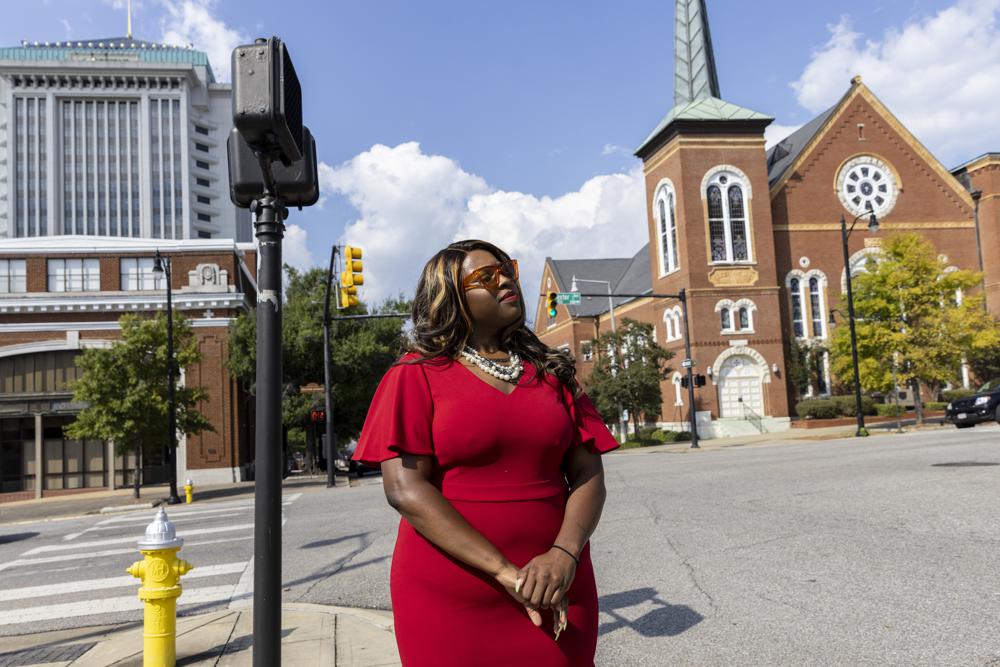
The invisible line dividing two of Alabama’s congressional districts slices through Montgomery, near iconic sites from the civil rights movement as well as ones more personal to Evan Milligan. There’s the house where his grandfather loaded people into his station wagon and drove them to their jobs during the Montgomery Bus Boycott as Black residents spurned city buses to protest segregation. It’s the same home where his mother lived as a child, just yards from a whites-only park and zoo she was not allowed to enter. The spot downtown where Rosa Parks was arrested, igniting the boycott, sits on one side of the dividing line, while the church pastored by the Rev. Martin Luther King Jr., who led the protests, sits on the other. The lines are at the center of a high-stakes redistricting case bearing Milligan’s name that will go before the U.S. Supreme Court on Tuesday, setting up a new test of the Voting Rights Act and the role of race in drawing congressional boundaries. At the center of the case is a challenge by various groups arguing that the state violated the federal Voting Rights Act by diluting the political power of Black voters when it failed to create a second district in which they make up a majority, or close to it. African Americans account for about 27% of the state’s population but are the majority in just one of the state’s seven congressional districts. “Our congressional map is not reflective of the population that lives in Alabama,” said Milligan, 41, one of several voters who joined interest groups in filing the lawsuit. The case the Supreme Court will take up Tuesday centers on whether congressional districts in Alabama were drawn to reduce the political influence of Black voters, but it’s also part of a much broader problem that undermines representative government in the U.S. Both major political parties have practiced gerrymandering — drawing congressional and state legislative boundaries to cement their hold on power — but Republicans have been in control of the process in far more states since after the 2010 elections. That has allowed them to win an outsized share of statehouse and U.S. House seats and means GOP policies — including on abortion restrictions — often don’t reflect the will of most voters. An Associated Press analysis from 2017 showed that Alabama had one of the most gerrymandered congressional maps in the country. Republicans dominate elected office in Alabama and are in charge of redistricting. They have been resistant to creating a second district with a Democratic-leaning Black majority that could send another Democrat to Congress. A three-judge panel that included two appointees of President Donald Trump ruled unanimously in January that the Alabama Legislature likely violated the Voting Rights Act with the map. “Black voters have less opportunity than other Alabamians to elect candidates of their choice to Congress,” the panel said. The judges ordered state lawmakers to draw new lines for this year’s election and create a second district where Black voters either made up a majority or near majority of the population. But on a 5-4 vote in February, the Supreme Court sided with Alabama to allow this year’s congressional elections to take place without adding a second predominantly Black district. Two justices suggested it was too close to spring primaries to make a change. The lawsuit claims the Alabama congressional map dilutes the voting strength of Black residents by packing a large number of them into a single district — the 7th, where 55% of voters are Black — while fragmenting other communities. That includes the state’s Black Belt region and the city of Montgomery. The current districts leave the vast majority of Black voters with no realistic chance to elect their preferred congressional candidates anywhere outside the 7th district, the lawsuit contends. “This is just about getting Black voters, finally, in Alabama, the opportunity to elect their candidates of choice. It’s not necessarily guaranteeing that they will have their candidate elected,” said Deuel Ross, senior counsel at the NAACP Legal Defense and Educational Fund, which is representing the plaintiffs. The groups contend that the state’s Black population is large enough and geographically compact enough to create a second district. Milligan, who is six generations removed from enslaved ancestors who lived in the Black Belt, ticked off the consequences for Black residents who are not able to have representation that aligns with their needs: addressing generational poverty, the lack of adequate internet service, Medicaid expansion and the desire for a broader array of health care services. “In choosing not to do that, you’re denying the people of the Black Belt the opportunity to elect an additional person that can really go to the mat on their interests,” said Ross, who is one of the attorneys who will argue the case in a challenge backed by the Biden administration. African Americans served in Alabama’s congressional delegation following the Civil War in the period known as Reconstruction. They did not return until 1993, a year after the courts ordered the state to reconfigure the 7th Congressional District into a majority-Black one, which has since been held by a succession of Black Democrats. That 1992 map remains the basis for the one in use today. “Under numerous court challenges, the courts have approved this basic plan. All we did is adjust it for population deviation,” said state Rep. Chris Pringle, a Republican and chairman of the legislative committee that drew the new lines. Alabama argued in court filings that the state’s Black population is too spread out to be able to create a second majority district without abandoning core redistricting principles such as keeping districts compact and keeping communities of interest together. Drawing such a district, the state argued, would require mapping acrobatics, such as connecting coastal areas in southwest Alabama to peanut farms in the east. In a statement to The Associated Press, Alabama Attorney General Steve Marshall said the map is “based on race-neutral redistricting principles that were approved by a bipartisan group of legislators.” He said it looks similar to
Terri Sewell commemorates the 59th Anniversary of the bombing of the 16th Street Baptist Church

Thursday was the 59th anniversary of the bombing of the 16 Street Baptist Church in Birmingham that killed four little girls during the height of the Civil Rights Movement. Congresswoman Terri Sewell spoke on the floor of the U.S. House of Representatives to commemorate this tragic incident of domestic terrorism. On September 15, 1963, white supremacists detonated nineteen sticks of dynamite under the church, killing Addie Mae Collins, Denise McNair, Carole Robertson, and Cynthia Morris Wesley. “Four precious Little Girls—Addie Mae Collins, Denise McNair, Carole Robertson, and Cynthia Morris Wesley—who died in the sacred walls of the 16th Street Baptist Church in Birmingham, Alabama fifty-nine years ago,” Sewell said. “On September 15, 1963, as the Four Little Girls were getting dressed in the bathroom of the church basement, preparing to sing in the choir, nineteen sticks of dynamite placed under the church detonated. They totally exploded, causing the interior walls to actually fall in.” “The crowd of about 200 people who gathered for the 11:00 a.m. service, they evacuated the church,” Sewell continued. “But the church was filled with smoke, and underneath the debris laid Four Little Girls. Along with the little girls who lost their lives, dozens of others were injured that day, including Sarah Collins Rudolph, the younger sister of Addie Mae Collins, who was in the basement with her sister and the other girls preparing for church that day.” The senseless violence led to more protest marches and eventually the passage of civil rights legislation. “Due to the violently racist nature of the attack, thousands of African Americans protested across the State of Alabama, and in response, George Wallace called the police to break up the demonstrations,” Sewell said. “The violent clashes between the protesters and police resulted in massive arrests and the tragic loss of two more lives, two little boys that died that day, Johnny Robinson and Virgil Ware. The two boys, one sixteen and the other thirteen, were killed within hours of the church bombing.” Dr. Martin Luther King Jr. described the bombing as one of the most vicious, tragic crimes ever perpetrated against humanity, “Although we will never replace the lives lost or injuries suffered, the passage of the Civil Rights Act of 1964 and the Voting Rights Act of 1965 proved that their sacrifices were not in vain,” Sewell said. “Today, as we reflect on our painful history, we are reminded that every gain in the battle for Civil Rights has come at a high cost, paid by those who sacrificed everything for a vision and a dream bigger than themselves.” “As a direct beneficiary of the legacy of the Four Little Girls, I was honored that the very first bill that I passed in this body posthumously bestowed upon them the Congressional Gold Medal to ensure that this nation will never forget their sacrifice,” Sewell said. The story of the 4 Little Girls was made into a Spike Lee documentary in 1997 by the same name. Terri Sewell represents Alabama’s Seventh Congressional District. To connect with the author of this story, or to comment, email brandonmreporter@gmail.com.
Will Sellers: Bending the universe towards justice

Dr. Martin Luther King argued that the arc of the moral universe is long and bends toward justice. This geometry lesson was used to illustrate a belief that history is pulled gravitationally towards freedom. One of the early “moral arcs” occurred 807 years ago this month when the Magna Carta was signed at Runnymede. This critical event would set in motion several important concepts now ingrained in our system of government. Perhaps the most important ideas acknowledged by the Magna Carter were that the British monarchs were not above the law, and their powers were neither limitless nor were they able to impose rules that violated established legal customs.One custom that seems to attract universal interest is the power to tax and exploit from others their property to benefit the prevailing concept of the common good. Even in 1215, people had a tolerance for an acceptable level of taxation, but they also had a concept of excessive taxation, which was always a source of acrimony between the governed and civil authority. While the Magna Carta addressed several issues, arbitrary taxation set in motion a fundamental concept that would be refined over time to require a process allowing taxpayers to consent or otherwise participate in the approval of any new taxes. To curtail the King’s power to tax was significant. The King, like any sovereign, depended on taxes to support his palace, prerogatives, and policies. Indeed, one hallmark of absolutism is the ability to squeeze as much revenue from as many people to create a government directed solely by the monarch and accountable to no one. Limiting the purse of the ruler was a mark along the road to greater liberty and freedom. It would be a stretch to argue that the Barons who forced King John to sign the Magna Carta were the first economic supply-siders. They were merely tired of funding royal initiatives that offered no local benefit while siphoning money and commodities out of their community. The effect of the Magna Carta was a step toward limiting the government and allowing communities to retain their crops, gold, and property. Kings, like any other authority, chafe at having their financial plans approved by others. In King John’s case, he reluctantly signed the Magna Carta and later repudiated it, which started a war with his nobles. This civil war ended only after his successor, King Henry III, agreed to confirm the terms of the Magna Carta and reissued it to show royal assent. The Magna Carta, by requiring some form of consent to levy and collect tax, indirectly created the need for a parliament to approve the King’s explanation of what taxes were necessary and why. Few societies in the 13th Century had any notion of assembling people together so the King could confirm his limited power by asking his subjects for taxes.The uniqueness of this system would create an expectation of a relationship to balance the interests of the government and the governed. As the arc of history moved forward with Parliament, the powers of the King eroded, and greater power was ceded to a representative body. While Parliament grew in authority, later, it too would come under scrutiny when it abused power and failed to recognize that it no longer represented the governed. With the industrial revolution and the growth of a middle class, the power in Parliament became more reflective of an elite class with little attention to changes in the country. And so it was that 190 years ago this month, the Great Reform Act was passed to correct how members of Parliament were elected. As Parliament developed, there was no uniformity in what constituted a district to elect a representative. In some cases, districts might be relatively small with limited land and population, while other districts would be much larger. By the same token, there was no set requirement of just who was eligible to vote in a district. Qualifications varied, which allowed the hierarchy to control both the voting district and the voters. So, in the 1830s, rather than a voice of the people, Parliament had become more like King John in 1215 and lost touch with the population. It now abused its power by imposing laws, taxes, and a system that had no accountability to an industrialized country. Like the nobles, the growing middle class wanted a say in how government impacted their lives.Proving once again the dynamic of the English system, Parliament reformed itself. In an appeal to liberty, the goodwill of all citizens, and belief in representative government, in 1832, Parliament accomplished two critical things in bending the arc of history toward justice. First, the act changed how districts were allocated within cities and counties. Gone were the abusive boroughs controlled by an elite, and in their place were districts with similar populations and interests. Though not even remotely approaching the concept of “one man, one vote,” it still served as the genesis of voting districts with proportional representation. Second, the franchise was expanded to allow a lower threshold of property ownership for eligibility to vote. This increased the eligible voting population by more than 55%. While women were not allowed to vote, and lower classes continued to be excluded in the march toward greater participation in government, it was a clear step toward justice.The act also created an objective system of voter registration that was the primary responsibility of local government. Additionally, boards were established to hear appeals for disputes about qualifications to vote, which further established a notion of due process by defusing power to allow a review of voting eligibility by a higher authority. Both the Magna Carta in 1215 and the 1832 Reform Act continued a process to allow greater liberty, more freedom, and expanded justice, and these two initiatives served as bright beacons along the arc of history, moving civilization towards greater self-determination. Will Sellers is a graduate of Hillsdale College and an Associate Justice on the Supreme Court of Alabama. He is best reached at jws@willsellers.com.


